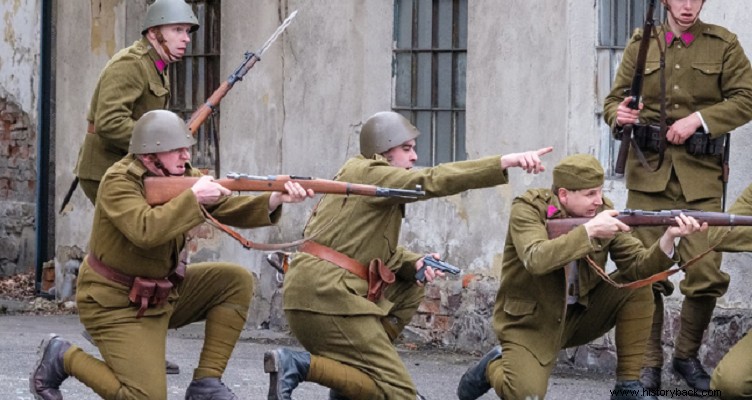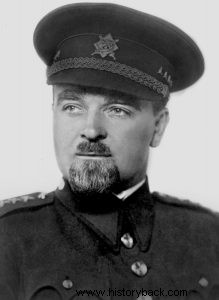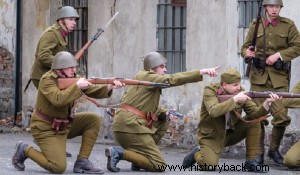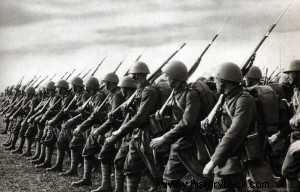
Czechoslovakia was literally sold by the British and French to Hitler in 1938 with the failed Munich Agreement in 1938. Hitler in violation of even this favorable agreement for him ordered the occupation of Czechoslovakia which was dissolved as state with Slovakia becoming an "independent" satellite state of Germany. It is generally believed that the Czechoslovaks surrendered to the Germans without a fight. But this is not true and already before the Munich Agreement there were serious incidents with deaths on both sides of the border and in the Suditic regions. However the most important conflict took place in the barracks of Čaanek in the small town of Friedek-Mistek in Moravia-Silesia in today's Czech Republic.
The Germans invaded Czechoslovakia on March 14, 1939, almost six months before the start of World War II. The Germans were in a hurry to occupy the industrial area of Ostrava for fear of its possible occupation by the Poles. So, in a hurry, they invaded the area without encountering any resistance, since the Czechoslovak government had ordered the surrender of its forces and cut off communications in the area. So at the Čaanek barracks where three companies under Captain Karel Pavlik were stationed, the order to lay down arms never arrived.
The German 8th Infantry Division (MP) had undertaken the mission of occupying Friedek-Mistek reinforced with the Body Guard "Adolf Hitler". It was led by the 84th Infantry Regiment (IP). In the afternoon of the 14th the Germans arrived in the city. There was the Chaanek camp, an old barracks built by the Austrians who once dominated the area. Only 250 Czech soldiers remained in the barracks (those of German, Hungarian and Slovak origin had deserted). The vast majority of men were new recruits with only 14 days of service. They were led by Captain Karel Pavlik, commander of the 12th Machine Gun Company. He was accompanied by Lieutenant Martinek and 30 other officers joined his force.
The battle
The German phalanx approached the barracks and halted nearby. A German officer with some soldiers moved towards the main gate. The purpose, Lance Corporal Bohuslav Pribila asked the Germans to stop. However, the German, pistol in hand, continued to march towards the gate with his men. The Czech fired a warning shot. In response, the Germans shot him, injuring him. The Czech fell to the ground and although wounded shot and wounded the German officer. On hearing the shots, Pavlik mobilized his men by deploying them in two trenches that he had – presciently – ordered to be dug in the barracks, while he also placed men in the windows of the second floor. His force had a few machine guns, rifles and a total of 50 grenades and an anti-tank rifle.
The Germans immediately deployed his approximately 1,200 men and supported by an Sd.Kfz 221 armored vehicle attacked the gate. However, the armored vehicle was neutralized by the anti-tank rifle and the Czechs opened fire on the Germans, killing and wounding several. Soon the Germans called the Czechs with loudspeakers to surrender but when they attacked a second time they were again forced to retreat with losses although in the meantime they were reinforced with anti-tank guns and 5 and 8 cm mortars.
Soon the Germans launched a third attack. They managed to drive the Czechs out of the trenches but they continued to resist from inside the building although it was clear that they had no hope. For the next 40 minutes the battle continued fiercely with the Germans bringing in a second armored car, while Pavlik operated a machine gun alone, with great success, on the roof of the building.
At one point the senior Czech commander in the area, Colonel Eliasberk,. he was called upon by the Germans to persuade the defenders to surrender. But Pavlik ignored the order and continued to fight. The battle continued throughout the night with the Germans pounding the building with their guns and mortars. The Czechs were holding but running out of ammunition. So Pavlik was forced to order a ceasefire. The Czech soldiers were disarmed and released by the Germans. Pavlik also followed his men, and the Germans, honoring his bravery, allowed him to keep his pistol. The Germans had 18 dead and many wounded, compared to only 2 Czechs wounded.
The end of a hero
Pavlik and Martinek joined the resistance almost immediately. Pavlik helped flee Czech pilots to Britain and then moved to Prague taking on more critical duties. However, he was betrayed and captured by the Germans. He suffered horrible torture without opening his mouth. Then he was sent to Mauthausen concentration camp - hell where he was murdered in October 1943. His body was never found...



